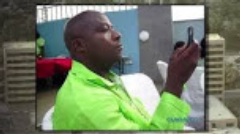 DALLAS (AP) – The death of the first Ebola patient diagnosed in the United States renewed questions about his medical care and whether Thomas Eric Duncan’s life could have been extended or saved if the Texas hospital where he first sought help had taken him in sooner.
DALLAS (AP) – The death of the first Ebola patient diagnosed in the United States renewed questions about his medical care and whether Thomas Eric Duncan’s life could have been extended or saved if the Texas hospital where he first sought help had taken him in sooner.
Duncan died in Dallas on Wednesday, a little more than a week after his illness exposed gaps in the nation’s defenses against the disease and set off a scramble to track down anyone exposed to him.
The 42-year-old Liberian man had been kept in isolation since Sept. 28 at Texas Health Presbyterian Hospital, where a fevered Duncan first showed up days earlier and told the staff he had been in West Africa. Doctors initially sent him home. He returned after his condition worsened.
Dr. Phil Smith is the director of the biocontainment center at the Nebraska Medical Center, where an NBC News freelance cameraman is being treated for Ebola. He said getting early treatment is key to surviving Ebola.
When a patient reaches the point of needing dialysis and respiratory help, as Duncan did this week, there may be little doctors can do.
“At that point, any kind of intervention, whether it is an antiviral drug or convalescent plasma, is less likely to work,” said Smith, an infectious disease specialist.
Duncan carried the deadly virus with him from his home in Liberia, though he showed no symptoms when he left for the United States. He arrived in Dallas on Sept. 20 and fell ill several days later.
Of the six Ebola patients treated so far in the U.S., Duncan was the only one not cared for in one of the special hospital units set up to deal with highly dangerous germs. That’s because health officials knew the others had Ebola at the time they decided where the patients should go, whereas Duncan sought care at Texas Health Presbyterian hospital on his own.
Health officials also have said that any hospital with isolation capabilities can treat Ebola patients, but Duncan’s death is sure to renew attention on the hospital’s response.
There is no way to know whether any specific treatment or step might have saved Duncan’s life. At the time of his death, he was taking an experimental antiviral drug.
He died “despite maximal interventions,” said Dr. Tom Frieden, director of the Centers for Disease Control and Prevention. “The earlier someone is diagnosed, the more likely they will be to survive.”
Pastor George Mason of Wilshire Baptist Church in Dallas was present when county officials told Louise Troh, the woman Duncan had been staying with, of his death.
“She expressed all the what-ifs,” including whether the initial delay in admitting Duncan made a difference, Mason said.
Health officials have identified 10 people, including seven health workers, who had direct contact with Duncan while he was contagious. Another 38 people also may have come into contact with him. The four people living in the Dallas apartment where Duncan stayed were moved to another home and are in isolation.
Officials have said everyone who had potential contact with Duncan is being monitored for 21 days, the maximum incubation period for the disease, which can cause vomiting, diarrhea, bleeding and in later stages, damage to vital organs.
The hospital has changed its explanation several times about when Duncan arrived and what he said about his travel history. The hospital has said the staff did not initially suspect Ebola, even though Duncan told them on his first visit that that he came from West Africa.
His body was to be cremated and his remains returned to the family. The Centers for Disease Control recommends that bodies of Ebola victims not be embalmed and instead suggests they be cremated or promptly buried in a hermetically sealed casket.



